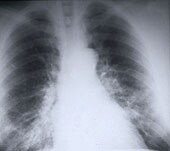

THURSDAY, Sept. 10, 2015Nonsmokers account for a growing percentage of aggressive lung cancer cases in the United States and the United Kingdom, new research finds.
In one study, British researchers found that over seven years the proportion of U.K. never-smokers with non-small cell lung cancer jumped from 13 percent to 28 percent.
Similarly, a study of lung cancer patients at three U.S. hospitals reported that never-smokers accounted for a growing percentage of non-small cell lung cancer patients between 1990 and 2013. These nonsmokers with lung cancer were more likely to be women, the researchers said.
The findings didn’t surprise Dr. Karen Reckamp, medical director of the lung cancer and thoracic oncology program at the City of Hope Cancer Center in Duarte, Calif.
“As smoking rates declined, we continue to see more patients diagnosed with lung cancer who do not have a prior smoking history,” said Reckamp, who wasn’t involved in either study.
The lung cancer that affects nonsmokers appears to be a different disease, Reckamp said. “We know that nonsmoking lung cancer is a distinct entity and often presents with specific genetic changes in the cancer that drive tumor growth,” she said.
She and other experts suspect genetic and environmental factors may be to blame.
Non-small cell cancer — by far the most common type — is aggressive and usually diagnosed at a later stage when it is harder to treat, according to the American Cancer Society. It is especially challenging to detect in nonsmokers because there are no known risk factors that merit screening, researchers said.
The British findings were based on medical records for 2,170 U.K. patients who underwent surgery for lung cancer between 2008 and 2014.
In the U.S. study, a team led by Dr. Lorraine Pelosof analyzed data on more than 12,000 lung cancer patients at the University of Texas Southwestern Medical Center at Dallas, Parkland Hospital in Dallas and Vanderbilt University in Nashville.
Pelosof and colleagues compared data compiled from 1990-1995 and 2011-2013. “In 1990 to 1995, 9 percent of non-small cell patients were never-smokers. By 2011-2013, nearly 15 percent were,” said Pelosof, an assistant professor of hematology-oncology at the University of Texas Southwestern Medical Center.
In comparison, nonsmokers with small cell lung cancers — a less common form of disease — increased only slightly, from 1.7 percent to 2.5 percent in the later period, the study found.
Small cell cancers account for about 10 percent to 15 percent of U.S. lung cancer cases, the American Cancer Society says.
Results of both studies were scheduled for presentation this week in Denver at a conference organized by the International Association of the Study of Lung Cancer. Data and conclusions should be considered preliminary until they’re published in a peer-reviewed medical journal.
Experts said they can’t explain why nonsmokers are a growing proportion of lung cancer diagnoses, or why women seem especially vulnerable.
Besides smoking, Pelosof said, exposure to asbestos and radon are known risks for lung cancer. Genetic factors are thought to play a role, too.
The increased proportion of nonsmokers with lung cancer doesn’t seem to be due to better diagnostic methods, she said. However, Pelosof acknowledged her team’s findings need to be confirmed in other studies, noting that one limitation of her research is that participants’ smoking status was self-reported.
Reckamp said other studies are looking at genetic risk and family history to zero in on who might be at risk for these cancers, despite no tobacco exposure.
Most lung cancers don’t cause noticeable symptoms until the disease is advanced, says the American Cancer Society. However, if you have a persistent cough or bronchitis or hoarseness, the society recommends seeing your doctor for a checkup.
More information
To learn more about lung cancer, visit American Cancer Society.
Source: HealthDay
Copyright © 2024 HealthDay. All rights reserved.

Leave a Reply